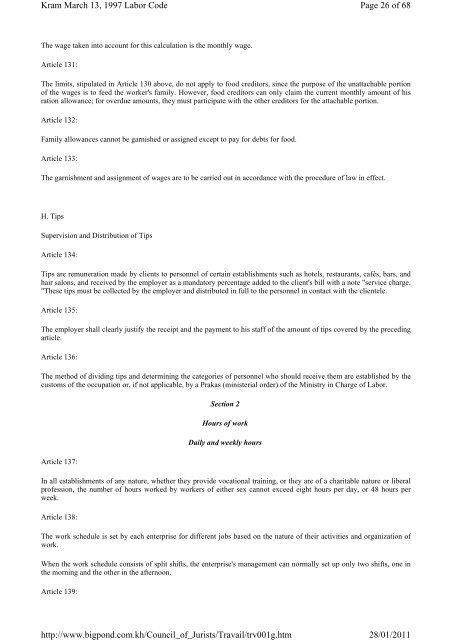Labour Law of 13 March 1997, English [pdf - International Labour ...
Labour Law of 13 March 1997, English [pdf - International Labour ...
Labour Law of 13 March 1997, English [pdf - International Labour ...
You also want an ePaper? Increase the reach of your titles
YUMPU automatically turns print PDFs into web optimized ePapers that Google loves.
Kram <strong>March</strong> <strong>13</strong>, <strong>1997</strong> Labor Code<br />
The wage taken into account for this calculation is the monthly wage.<br />
Article <strong>13</strong>1:<br />
The limits, stipulated in Article <strong>13</strong>0 above, do not apply to food creditors, since the purpose <strong>of</strong> the unattachable portion<br />
<strong>of</strong> the wages is to feed the worker's family. However, food creditors can only claim the current monthly amount <strong>of</strong> his<br />
ration allowance; for overdue amounts, they must participate with the other creditors for the attachable portion.<br />
Article <strong>13</strong>2:<br />
Family allowances cannot be garnished or assigned except to pay for debts for food.<br />
Article <strong>13</strong>3:<br />
The garnishment and assignment <strong>of</strong> wages are to be carried out in accordance with the procedure <strong>of</strong> law in effect.<br />
H. Tips<br />
Supervision and Distribution <strong>of</strong> Tips<br />
Article <strong>13</strong>4:<br />
Tips are remuneration made by clients to personnel <strong>of</strong> certain establishments such as hotels, restaurants, cafés, bars, and<br />
hair salons, and received by the employer as a mandatory percentage added to the client's bill with a note "service charge.<br />
"These tips must be collected by the employer and distributed in full to the personnel in contact with the clientele.<br />
Article <strong>13</strong>5:<br />
The employer shall clearly justify the receipt and the payment to his staff <strong>of</strong> the amount <strong>of</strong> tips covered by the preceding<br />
article.<br />
Article <strong>13</strong>6:<br />
The method <strong>of</strong> dividing tips and determining the categories <strong>of</strong> personnel who should receive them are established by the<br />
customs <strong>of</strong> the occupation or, if not applicable, by a Prakas (ministerial order) <strong>of</strong> the Ministry in Charge <strong>of</strong> Labor.<br />
Article <strong>13</strong>7:<br />
Section 2<br />
Hours <strong>of</strong> work<br />
Daily and weekly hours<br />
In all establishments <strong>of</strong> any nature, whether they provide vocational training, or they are <strong>of</strong> a charitable nature or liberal<br />
pr<strong>of</strong>ession, the number <strong>of</strong> hours worked by workers <strong>of</strong> either sex cannot exceed eight hours per day, or 48 hours per<br />
week.<br />
Article <strong>13</strong>8:<br />
The work schedule is set by each enterprise for different jobs based on the nature <strong>of</strong> their activities and organization <strong>of</strong><br />
work.<br />
When the work schedule consists <strong>of</strong> split shifts, the enterprise's management can normally set up only two shifts, one in<br />
the morning and the other in the afternoon.<br />
Article <strong>13</strong>9:<br />
http://www.bigpond.com.kh/Council_<strong>of</strong>_Jurists/Travail/trv001g.htm<br />
Page 26 <strong>of</strong> 68<br />
28/01/2011

















